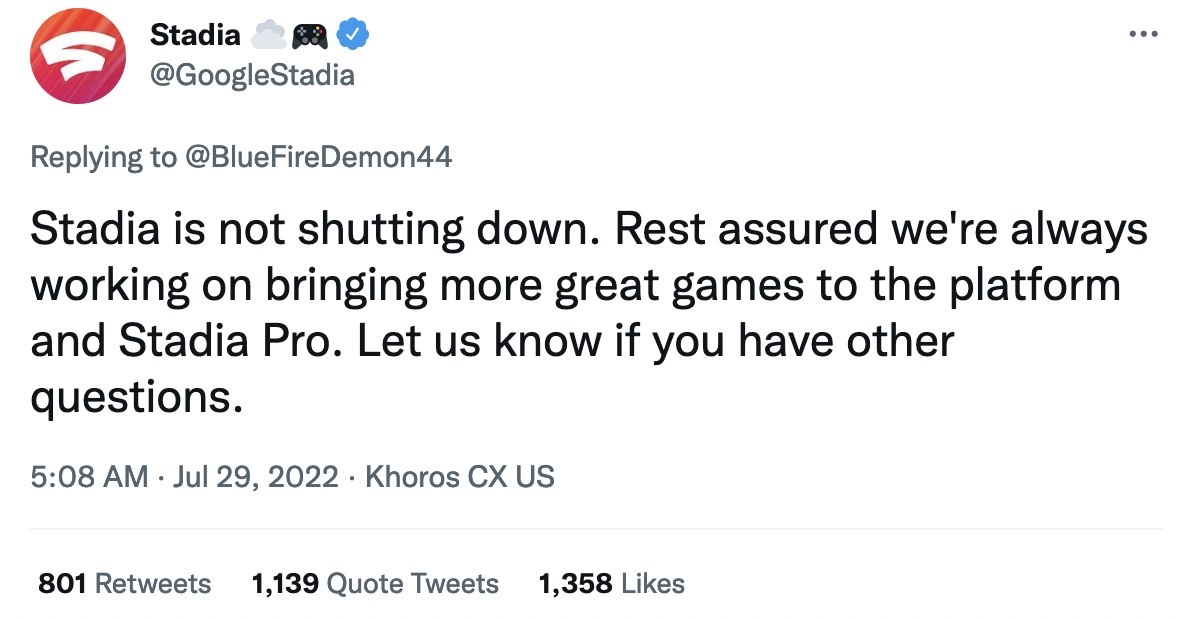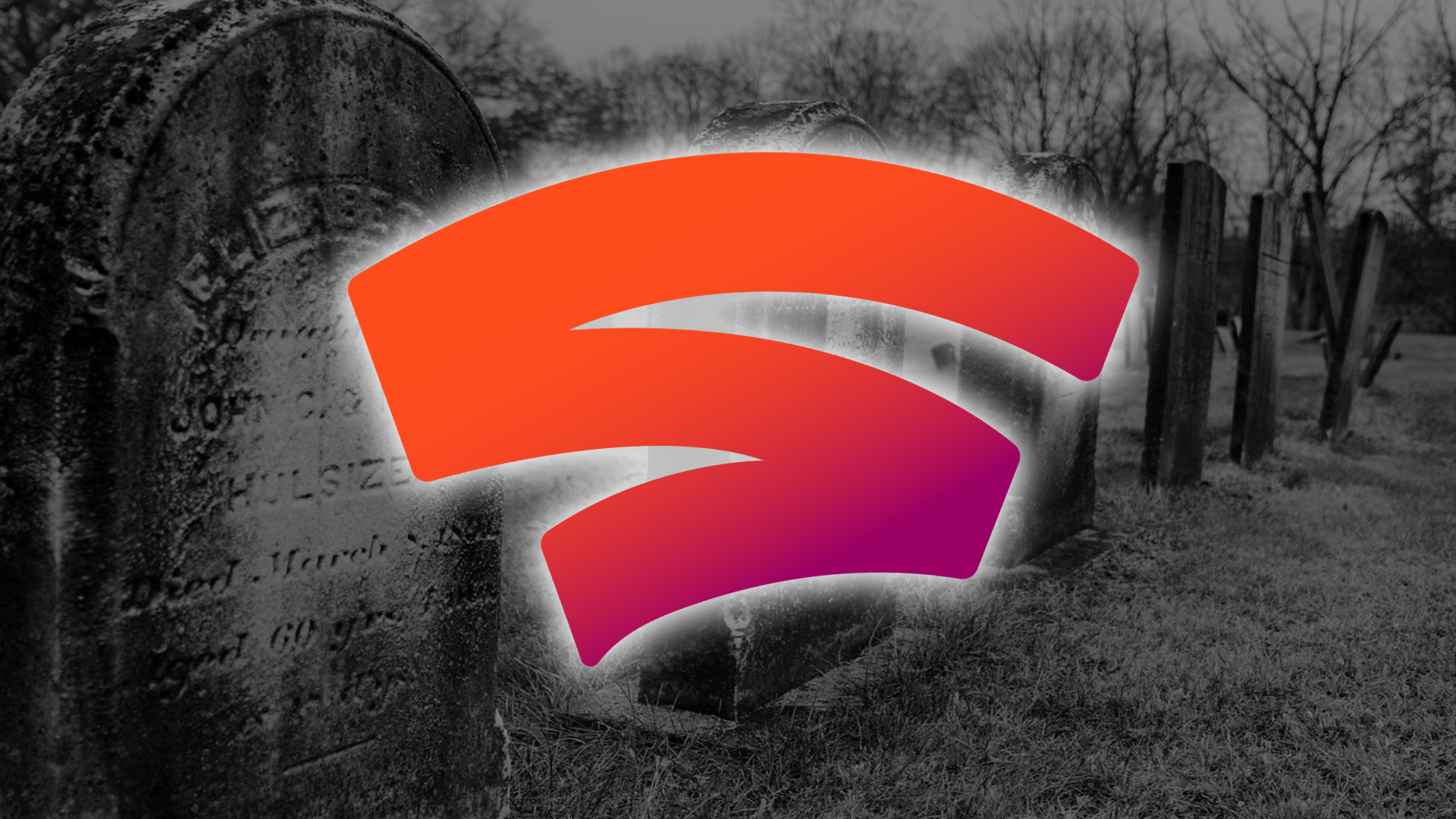- Google’s Stadia cloud gaming streaming service is to be shut down after years mired in mismanagement and controversy.
- The service was first announced in 2019 and was initially lauded as a game-changer for the industry.
- Stadia’s doom leaves behind throngs of fans – but was it always destined to fail?
Google shook the gaming industry to its core in 2019 when it announced the world’s first major cloud gaming system – Google Stadia.
A revolutionary idea. The Stadia platform would allow users to stream their video games from anywhere (web browsers, smart TVs and other consoles) that could run its application, as long as it was connected to the internet.
The only hardware component needed was the Stadia’s own controller, and with it, users would have access to real cloud gaming streamed directly to their screens at 60fps with HDR and 4K resolution, or so Google claimed.
Some commentators felt that it was the future of the industry. That console gaming would be buried by the cloud with Stadia leading the charge. Others were highly critical. Saying that Stadia would not be able to produce the frame rate it promised. That it was dead in the water and that Google’s track record with tech already pointed toward the system’s eventual doom.
Time would show that it was those in the latter camp that would be correct with the company announcing last week that Stadia will be officially shut down in January 2023.
This is despite Google and Stadia’s own communications consistently stating that the service would continue to grow and that the end was far from sight.

Vice president and general manager of Stadia, Phil Harrison, gave the official reason for Stadia’s closure in a company Blog post, stating that the service hadn’t “gained the traction with users that [Google] expected” and thus the service would have to be shut down gradually.
WATCH: The Stadia’s first launch trailer
However, over the course of the four years since it was announced, Stadia was victim to a series of blunders on the part of its creators, namely:
- The Stadia didn’t ship with many of the exciting features it promised during its initial announcement – including 4K screen support on the Chromecast. Polygon wrote that for a service priced at $129 (R2 331.42) it was highly disappointing that the Stadia didn’t launch with HDR and 4K support across its entire service.
- A complex series of ways to purchase and use the Stadia also complicated its launch. Initially, users would have to purchase a Founder’s Pack, as well as a three-month subscription to use the service. This was then later changed to allow any user with a Gmail account to use the service as long as they bought games from the Stadia store or paid a $9.99 (R180) monthly subscription.
- In 2021, Stadia’s internal game development studios were shut down and most of the team was shifted to work in other departments.
In February 2022 Hypertext reported that within Google, the Stadia division’s time was being shifted away from its main focus on the consumer segment towards a more commercial, white-label service focus. Already showing that the company had noticed better uses for Stadia’s technology outside of a gaming console-like system. This includes making cloud-based games for large corporations such as Peloton and AT&T.
“The underlying technology platform that powers Stadia has been proven at scale and transcends gaming. We see clear opportunities to apply this technology across other parts of Google like YouTube, Google Play, and our Augmented Reality (AR) efforts — as well as make it available to our industry partners, which aligns with where we see the future of gaming headed,” wrote Harrison.
“We remain deeply committed to gaming, and we will continue to invest in new tools, technologies and platforms that power the success of developers, industry partners, cloud customers and creators,” he added.
Harrison continued to say that many of the Stadia team would continue their work on the technology and keep it “moving forward” in other parts of the company.
In the end, it’s the players that will be most affected by the shuttering of the cloud gaming system. A real community had sprung about around Stadia. The service’s official subreddit has over 119 000 users. The post of one user sharing their Stadia-inspired tattoo even went viral over the weekend with the news of the service’s closure. Another user could reportedly to lose over 6000 hours of progress in Red Dead Online after the Stadia finally expires.
At the very least Google is refunding all purchases made through the Google Store and the Stadia Store to its users.
WATCH: Gameplay comparison of Stadia vs. PC and PS4
In four months Stadia is set to join Google Glass, Google Hangouts, and a myriad of other promising innovations killed by the tech giant in recent years.
The future of cloud gaming grows a bit more dim with its passing, but at least companies like Microsoft and NVIDIA will have a case to study on how it isn’t done.

